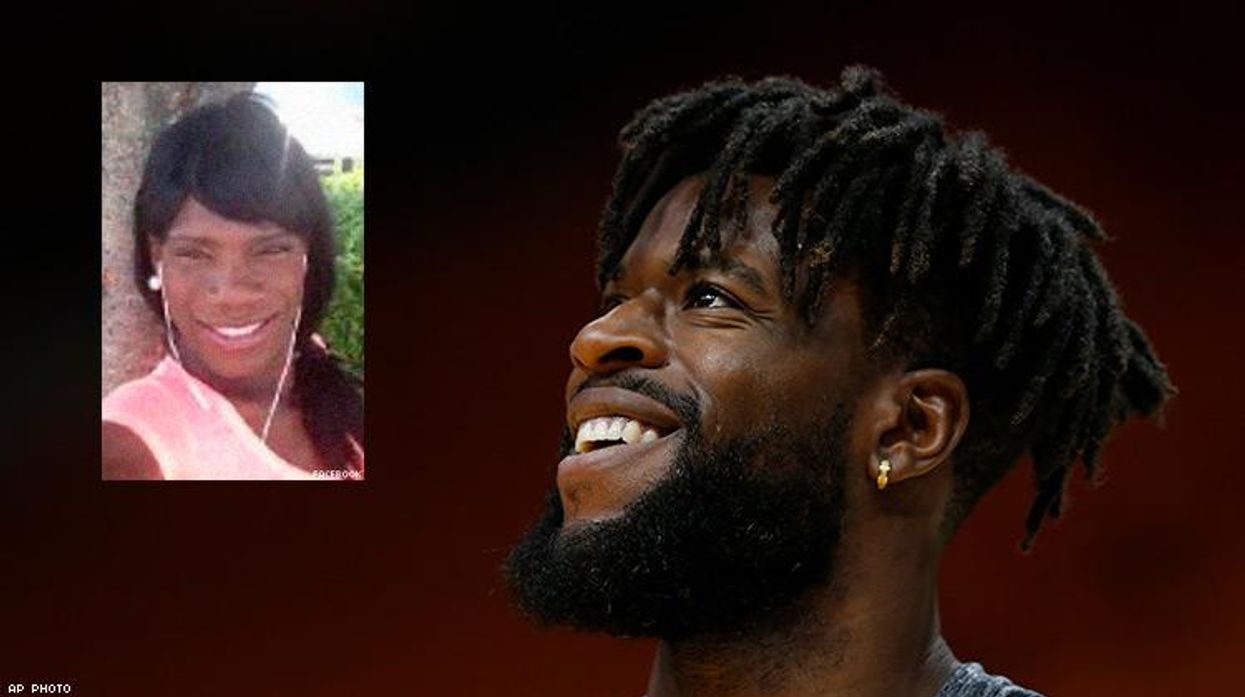Sports
Why a Straight NBA Player Got an 'LGBTQ' Tattoo

Reggie Bullock
Reggie Bullock of the Detroit Pistons is keeping the memory of his trans sister, Mia Henderson, alive through LGBT activism.
May 04 2018 4:45 AM EST
dnlreynolds
By continuing to use our site, you agree to our Privacy Policy and Terms of Use.

Reggie Bullock of the Detroit Pistons is keeping the memory of his trans sister, Mia Henderson, alive through LGBT activism.
Reggie Bullock, a small forward for the Detroit Pistons, has emerged as a leading ally of the LGBT community within the sports world.
The athlete, who will deliver a speech Saturday at the GLAAD Media Awards in New York City, has a heartbreaking backstory. His 26-year-old transgender sister, Mia Henderson, was killed in Baltimore in 2014. It is her memory that drives his advocacy today.
"It's something that was close to home to me," Bullock told The Advocate in a recent interview, about why he wanted to become a vocal ally. "I just want to bring equality within all lives."
Bullock said that, as a professional basketball player, "I just felt like it was my job to use that platform to bring awareness" of LGBT issues, including the epidemic of violence faced by the transgender community. In 2017, at least 28 trans women were killed in the United States -- the deadliest year on record.
Becoming an ally has been a journey for Bullock. After Henderson died in July 2014, Bullock tweeted a remembrance that misgendered his deceased sibling. In a video released for Transgender Day of Visibility by the Pistons this year, the player revealed that Henderson had never seen him play college basketball at the University of North Carolina, because "I always thought about what my teammates would think or what people would think."
\u201cFollowing the death of @ReggieBullock35's transgender sister Mia Henderson, he has pledged to take a stand for Transgender awareness and acceptance. He met with representatives of @GLAAD & @AthleteAlly & hosted a Pride Night to show his support for the LGBTQ community. https://t.co/cOOsFbuYtl\u201d— Detroit Pistons (@Detroit Pistons) 1522504803
"It hurt me, when I think about it now," Bullock admitted. "That was probably like one of the stupidest things. But I just didn't know so much about it, and I wasn't as comfortable about it."
"Just the impact that she had on my life and the happiness that she had with being herself always stuck with me even when she left," he said.
These past few years have been an education for the 27-year-old NBA player, who has made it his mission to learn more about LGBT issues and to pass that knowledge on to others.
After Henderson's death, Bullock's team connected him with GLAAD and Athlete Ally. These groups taught him how to address members of the LGBT community with knowledge and respect. Bullock is now using this media training "to stand up for the community as a straight guy," in order to share the story of his sister and to "save lives."
"It's still a process" learning to be an ally, he confessed. However, he has made great strides. Bullock has spoken out against anti-LGBT language in locker rooms and asked the NCAA to adopt trans-inclusive policies. One of his major goals is to make professional sports a more welcoming place for LGBT athletes.
"If they're just as good or can compete at the same level as I can, let the person compete," he said. "That's probably the biggest thing that I would like to see in sports -- try to integrate throughout" and "getting people more comfortable" with out players. Happily, Bullock said he has received no backlash for his activism -- just support from teammates and fans on social media.
One of his proposed initiatives for accomplishing this came to Bullock in a dream. "Just woke up out a dream and thought about playing in a [rainbow]-colored jersey to incorporate #LGBTQ into sports. @nba help me make it happen in my lifetime," he tweeted April 22.
\u201cJust woke up out a dream and thought about playing in a \ud83c\udf08 colored jersey to incorporate #LGBTQ into sports. @nba help me make it happen in my lifetime \ud83d\ude4c\ud83c\udffe\u201d— Reggie Bullock (@Reggie Bullock) 1524433631
"I feel like that would be kind of dope in the NBA for something like that to happen -- being able to just let the world know, let people know, let people younger than us know, that the goal is to be able to make it to the NBA, do anything within major sports that is a possibility for them, whether they are any type of way in this world," Bullock said of the jerseys.
The NBA has not yet responded to Bullock's idea, but the athlete is confident that the tweet, which has more than 600 retweets and nearly 3,000 likes at the time of this article's publishing, is on the organization's radar. While Bullock conceded that he could see "a lot of people not agreeing" to a full Pride jersey, he suggested a rainbow pin or socks as alternatives for showing solidarity.
Meanwhile, Bullock has a more permanent display of support. The athlete had "LGBTQ" and his sister's name tattooed on his leg. He did so "in remembrance" of Henderson, and also as a commitment to "being more involved within that community" than he was while she was living.
The tattoo is a reminder of one of his regrets. If he could give Henderson a message today, he would tell her, "I'm sorry for not being informed" or "being educated enough" about LGBT issues and her own experience as a transgender woman. On Saturday, when he delivers his speech in front of GLAAD and the world, he will commit "to do anything in my power" to honor her memory, and to help save lives of people like her.
Charlie Kirk DID say stoning gay people was the 'perfect law' — and these other heinous quotes